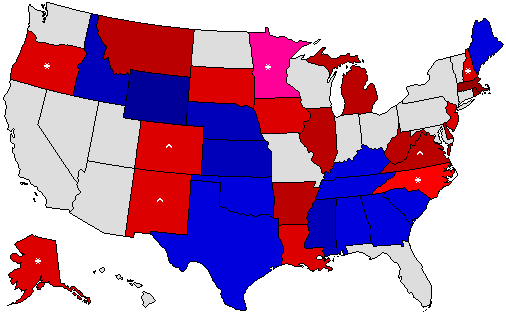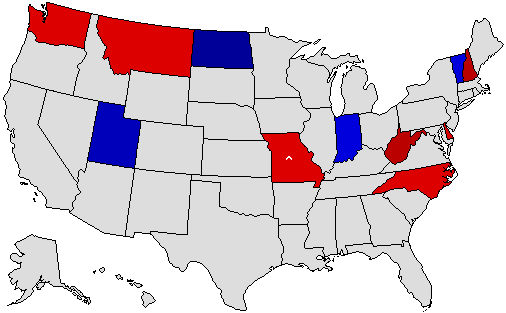The Atlas Weblog system has been upgraded to WordPress Mu – a scaleable blogging system for multiple users. Please send me a note if you have an interest in publishing your own free weblog on this site. The system also includes custom pages and will support your own weblog ads, if desired.
Author Archives: leip
New Predictions for 2008
 |
 |
Prediction scripts are now available for the 2008 Senate Election and the 2008 Gubernatorial contests (joining the already-available 2008 Presidential Predictions. The 2006 Senate aggregate prediction called 32 of 33 contests correctly – only missing Virginia. The 2006 Gubernatorial aggregate prediction called 35 of 36 contests correctly – only missing in Minnesota. Give a try at election prognostication! Continue reading
The Atlas Undergoes Software Upgrades
Yesterday, the Atlas operating system software and core services were upgraded. This included the core OS, Apache, MySQL, and PHP. Please submit a bug if you happen to find that any of the site features were broken by this upgrade. Many thanks and enjoy!
The 2008 Primary Mock Elections
With all the clamoring amongst the states to move primary contests to the front of the line, the Atlas has decided to leapfrog them all, unveiling today the 2008 Presidential Primary Mock Election contests: the 2008 Republican Mock Election and 2008 Democratic Mock Election. The Atlas Mock Elections in each state are set up as open primaries (meaning that any registered voter of any party affiliation may cast a ballot in either the Democratic or Republican primary). In the real primary and caucus system, each state sets the rules for participation:
- Open primaries allow voters of any party affiliation to vote
- Modified open primaries allow independent or unaffiliated voters as well as those affiliated with the party holding the election contest
- Closed primaries limit the participants to those registered with the party holding the election contest
The allocation of delegates for the Atlas Mock Primaries are modeled after the rules for each state – typically awarding delegates proportional to the popular vote in a given state or via winner-take-all (the same system as 48 states and the District of Columbia use in the general election to award Presidential Electors). In the real primary system, a certain set of delegates are allocated via the vote in congressional districts – this level of detail has been omitted on the Atlas mock election – where all the district delegates are awarded as part of the “at large” group. Overall, the primary process is quite complex.
Go now and cast your ballot!
Server Upgrade
The Atlas Server was replaced today with a new motherboard, faster processor, and more memory. Enjoy the improved performance!
Election 2006 Official Updates
Election data and maps from the 2006 General Election for U.S. Senate and Governor for most states have been uploaded to the site. A few states remain to release their official data, including my home state of Massachusetts. The expectation is for these data to be available within the next couple of weeks. The detailed county and town-level spreadsheets have also been updated with the most recently-available information.
Election Results 2006
Preliminary, unofficial election results (data and maps) for the 2006 Senate and Governor’s races are on-line. These data will be updated as election agencies across the country finalize and post official tallies. A final official compilation of data for all states is expected in early January. Population data for 2006 will be added when these data are released by the Census Bureau. Preliminary detailed spreadsheet files for these contests are available at the store. As always, once purchased, updates to spreadsheets are free.
Vote Today
 Today is election day. If you are reading this, you are most likely an election enthusiast and will likely vote – but in the off chance that you are considering not voting, here is my encouragement to do so. Exercise your right to choose the people who govern us. Don’t like the candidates running? write someone in. Turned off by the negativity and lack of civil debate? No one will ever know if you stay home. Most states have several choices on the ballot – Politics1 highlights many of the candidates running for state and federal offices.
Today is election day. If you are reading this, you are most likely an election enthusiast and will likely vote – but in the off chance that you are considering not voting, here is my encouragement to do so. Exercise your right to choose the people who govern us. Don’t like the candidates running? write someone in. Turned off by the negativity and lack of civil debate? No one will ever know if you stay home. Most states have several choices on the ballot – Politics1 highlights many of the candidates running for state and federal offices.
I cast my ballot this morning – a fill-in-the-oval paper ballot to be read by an optical scanner. This is a fast, relatively accurate system with full independent audit capability. Here in the Commonwealth of Massachusetts, there are unfortunately not a lot of contested races – my Representative in Congress in the 4th district, Barney Frank (D), is unopposed. The Senate race (Edward Kennedy (D)) has not been competitive, Secretary of State, Treasurer, and Auditor have no Republican challenger (they do however, have either Green-Rainbow or Working Families party challengers). The Governor’s race has been, by far, the most interesting and productive public debate (although the campaign was too negative in my opinion). There are three interesting ballot initiatives, however, and I cast my support for Question 2, allowing candidates to run on multiple ballot lines, more commonly referred to as fusion.
The Atlas will be posting updates throughout the evening for Senatorial and Gubernatorial races across the nation.
Atlas Community Election Endorsements
Several members of the Atlas community have suggested providing a feature for members to share their endorsements of candidates for the 2006 Senatorial and Gubernatorial contests. This feature has now been added to the Atlas (Links: Gubernatorial Endorsements and Senatorial Endorsements). A compiled map on the endorsements home page shows the aggregate of community endorsements. The new scripts include pages to show state-by-state listing of endorsement totals for each candidate.
2006 Rhode Island Senatorial Republican Primary
 The unofficial results are in from the competitive 2006 Republican Primary for Seante in Rhode Island. In this race, incumbent Senator Lincoln Chafee was challenged by Cranston Mayor Steve Laffey. The unofficial result published by the Rhode Island Board of Elections is: Chafee (i) 34,407 (54.22%); Laffey 29,052 (45.78%), a margin of about 8 percentage points.The township map reveals the strength of each candidate. Laffey performed best in the North (Providence County) outside the city. His best municipality is the town of Johnston where he won 62.8% of the vote. In his home-town city of Cranston, he received his largest vote margin of 447 votes, capturing 52.5% of the vote. Chafee had his strength in the city of Providence and the south of the state (Bristol, Newport and Washington Counties). His best municipaility is the town of New Shoreham (Block Island) where he received 78.3% of the vote. Chafee received his largest vote margin in the City of Warwick – 2,134 votes where he won 62.3% to 37.6%.An interesting statistic with regard to the lack of Republican Strength in Rhode Island – in the City of Providence (2000 Voting-Age Population of 128,341 – almost twice as many people as in Warwick, the second largest city): the total number of votes cast in the Republican primary was 2,941 votes, 1/5th the 14,861 votes cast in a far-less-competitive Democratic Primary.
The unofficial results are in from the competitive 2006 Republican Primary for Seante in Rhode Island. In this race, incumbent Senator Lincoln Chafee was challenged by Cranston Mayor Steve Laffey. The unofficial result published by the Rhode Island Board of Elections is: Chafee (i) 34,407 (54.22%); Laffey 29,052 (45.78%), a margin of about 8 percentage points.The township map reveals the strength of each candidate. Laffey performed best in the North (Providence County) outside the city. His best municipality is the town of Johnston where he won 62.8% of the vote. In his home-town city of Cranston, he received his largest vote margin of 447 votes, capturing 52.5% of the vote. Chafee had his strength in the city of Providence and the south of the state (Bristol, Newport and Washington Counties). His best municipaility is the town of New Shoreham (Block Island) where he received 78.3% of the vote. Chafee received his largest vote margin in the City of Warwick – 2,134 votes where he won 62.3% to 37.6%.An interesting statistic with regard to the lack of Republican Strength in Rhode Island – in the City of Providence (2000 Voting-Age Population of 128,341 – almost twice as many people as in Warwick, the second largest city): the total number of votes cast in the Republican primary was 2,941 votes, 1/5th the 14,861 votes cast in a far-less-competitive Democratic Primary.




